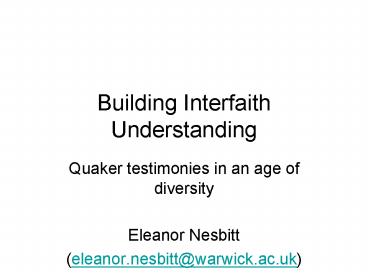Building Interfaith Understanding - PowerPoint PPT Presentation
1 / 19
Title:
Building Interfaith Understanding
Description:
Challenges for our Times' (lecture 2), Jordans. 9 October: reminders of historic encounters. 258 CE St Denis (who had angered Pagan priests) was beheaded on ... – PowerPoint PPT presentation
Number of Views:83
Avg rating:3.0/5.0
Title: Building Interfaith Understanding
1
Building Interfaith Understanding
- Quaker testimonies in an age of diversity
- Eleanor Nesbitt
- (eleanor.nesbitt_at_warwick.ac.uk)
- 9 October 2008
- Challenges for our Times (lecture 2), Jordans
2
9 October reminders of historic encounters
- 258 CE St Denis (who had angered Pagan priests)
was beheaded on Montmartre - 1003 Leif Erikson first European to land in
North America reached Newfoundland - Saints day for Louis Bertrand, Spaniard
- who converted indigenous people of central
America
3
Faith and religion some usages
- Faith confidence, trust, optimism
- faith community
- religion, world faith, system of
belief - Religion theology, truth claims
- source of solace, insight,
inspiration, -
vision, spirituality - community people with
history, - norms, rituals,
stereotypes
4
Religion as identity
- Identification with what we were born into
- Identification with what we have chosen
- (Phillip Hammonds primary and secondary
identification)
5
Building interfaith understanding
- Understanding standing below (humility)
- rapport negotiated settlement
- Building involves intention, design, expertise,
materials, labour, teamwork, ongoing need for
vigilance and repair - Understanding OF different faiths
(ideas/communities) - Understanding BETWEEN people of different faith
communities
6
Understanding of culture
- Need to understand significance of
- generation
- gender
- relative education and wealth
- shared values but which is prioritised?
- shared language - but what underlies and shapes
usage?
7
Globalisation and change
- Unprecedented pace and scale of inter-penetration
of the local and the global - Secularisation, consumerism, apathy to religion
- Diversity and liberalism
- Fundamentalism and radicalisation
- Changing media effect on allegiance and
religious authority - Appeal of spirituality
8
Diversity/plurality
- traditional plurality the jigsaw society made
up of Christian, Hindu etc communities - modern plurality the jigsaw individual
influenced by multiple contacts etc - Interfaith understanding involves jigsaw
individuals - Need to recognise the diversity (divisions,
processes of change) within faith communities
9
Challenges
- Competing/exclusive truth claims
- How do liberals relate to absolutists?
- Change its pace and diversity and the
- rising profile of Islam in Europe
- Tensions between and within communities
10
Secular responses
- The challenges posed by diversity are being met
by secular society nationally and internationally - UK government and social cohesion
- Blair Foundation
- Initiatives by EU, UNESCO etc
11
A Quaker contribution? Tradition and testimonies
- Tradition non-exclusive, experimental
- silence
- spirituality and service
- engagement with other faiths
- Testimonies ongoing, evolving witness
- TRUTH, PEACE, EQUALITY, SIMPLICITY, ENVIRONMENT
12
Testimonies
- Testimonies
- resonating with faiths insights and teachings
- challenging all communities
- guiding us in building interfaith understanding
13
Implications for education and nurture
- Informing ourselves about
- central emphases of faiths
- societys dynamics e.g. need for identity
- impact of international events
- Immersing ourselves in the words of sages and
saints for whom barriers between faiths are a
nonsense - Sharing these words
14
Implications for education and nurture
- Providing opportunities for
- Understanding ourselves our assumptions we are
all conditioned and can all be agents - Understanding through visual art, fiction,
poetry, drama, music - Quiet
15
My next step?
- listen (e.g. to taxi driver), read, reflect
- invite (a neighbour to my house a parent to my
class someone possibly from Meeting - to share
experiences, food, stories etc with the
childrens group groups to use our premises) - visit (a nearby church a neighbour an
exhibition a shop Polish/Iranian/Pakistani
etc) - share dialogue, meals, practical projects
16
Teachers may
- invite individuals who can share their
mixedness - increase resourcing on interfaith relations and
initiatives - vigilantly avoid generalising and stereotyping
- challenge the limitations of a 6 distinct world
faiths approach
17
Last words
- We are called to be the salt of the earth. There
is no expectation of the whole earth becoming
salt. We can bring out the best flavour of
others. (A Chinese Christian, BBC radio 4, 10
August 08) - The flowers of unselfish living may be found
growing in other peoples gardens and rich
fruits of the Spirit may be tasted from other
peoples trees. (Marjorie Sykes in Quaker Faith
and Practice 1999, 2711)
18
Last words
- The humble, meek, merciful, just, pious, and
devout souls are everywhere of one religion and
when death has taken off the mask they will know
one another, though the divers liveries they wear
makes them strangers. - (William Penn 1693, in Quaker Faith and Practice,
1999, 27 1)
19
(No Transcript)































